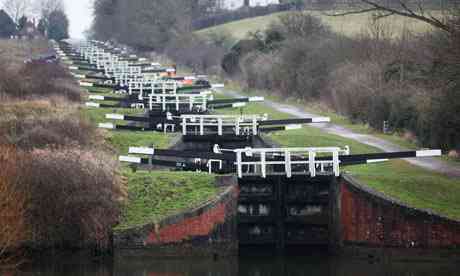
Caen Hill thatch in Devizes, Wiltshire. "If we don"t acclerate investment, the network will deteriorate," pronounced British Waterways trainer Tony Hales. Photograph: David Levene
The rebirth of Britain"s canals is one of the big metamorphosis successes of the last dual decades. They ride the satisfaction of the panorama to the heart of the city, yield a breakwater for wildlife and suggest a lifelike environment for a little of the majority fascinating civic homes.
But proposals to be submitted this month by British Waterways, the defender of 2,200 miles of canals and rivers, find to move them out of approach state carry out and in to the "third sector", arguing the move is the usually approach to guarantee their future.
The prophesy is for an "aquatic National Trust" galvanising the estimated eleven million Britons who continually good from them – boaters, anglers, cyclists, runners, Sunday strollers and waterside skill dwellers – to deposit time and income to safeguarding them for generations to come.
"Of march there are risks. Yes, it is radical. But I hold it is a no-lose call, and something has to be done," pronounced Tony Hales, authority of British Waterways. "The waterways are not about to tumble overnight. But over 10, twenty years, if we don"t accelerate investment, the network will deteriorate."
With open spending cuts unavoidable yes or no celebration is in energy and an expected rebate in the accede to British Waterways receives from the Department for Environment, Food and Rural Affairs, Hales believes the time is right. The proposals follow an 18-month consultation, and target to move the utilizing of canals closer to the people utilizing them.
Hales believes there is the organization to help the poor to lift it off. "There is extensive love for the waterways," he said. "The waterway vessel is right up there with the postbox as one of the iconic images of British life.
"Of course, it can"t be just similar to the National Trust, where you get a pass in to 50 buildings others have had to compensate £30 for. And we would have to utterly rebrand the image. What"s in it for people? A nice, comfortable feeling and the event to get involved. There is an armed forces of volunteers out there already clearing, restoring, maintaining."
Third-sector standing would concede British Waterways to steal for long-term investment, something it cannot do as a open corporation, whilst maintaining a supervision accede to on a renegotiated basement to do orthodox obligations for open health, reserve and benefit.
Hales said: "Why does a taxpayer in Blackpool account the Regent"s waterway in London? Why shouldn"t people vital on, benefiting from, unaware the Regent"s waterway have a little accede to towards it, in the form of income or volunteering, instead of it all entrance from executive government?
"[Canals] are a profitable asset, one that internal authorities good from. And if I own a code new prosaic in Birmingham, I"m not going to lay there and do zero if the waterway I disremember is full of floating passed dogs, or the draw paths are lonesome in dog shit, or the close gates don"t work, and the worth of my skill is going down. I"m going to get involved.""
Third-sector standing would additionally concede British Waterways to guarantee the £500m skill portfolio, that generates £45m a year. In times of predicament the Treasury"s eye mostly alights on this asset, but so far British Waterways has resisted a sell-off.
"£500m is not much, in conditions of the inhabitant debt," Hales said. Nevertheless, the Treasury, he admits, could be the fly in the salve for the proposals.
Other fundraising initiatives being explored embody the micro-generation of renewable energy, and the sale of "grey", or undrinkable, H2O to industry.
British Waterways has an annual income of £255m, together with a £74m supervision grant. The grant"s worth has depressed by 47% in genuine conditions given 2003. Hales expects it to tumble further, and wonders if it can go on competing for the taxpayers" income compulsory to say the network.
Organisations representing Britain"s 33,000 boaters and 3 million anglers determine something has to be done.
"The risk is not removing the required income to have the total thing work. But they have to do something radical," pronounced Mark Lloyd of the Angling Trust.
Brian Sharpe, editor of Towpath Talk magazine, said: "There is a lot of vigour get out of this mess, and I think it is a mess. It"s going to be a authorised minefield.
"It could go really wrong, but afterwards it can"t be any worse than it is at the moment".
No comments:
Post a Comment